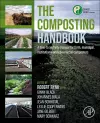
The Composting Handbook
7 contributors - Paperback
£97.99
Dr. Rynk has been researching and teaching about processing of waste and agricultural materials for over 30 years. His areas of expertise include waste management, biomass processing and conversion, natural treatment processes, odor management, spontaneous combustion and energy conversion and conservation. He is internationally recognized for his work and expertise in the field of composting. He has authored numerous publications about composting, waste management and energy. He holds a Professional Engineering license in Agricultural Engineering. He is a regular instructor for composting training schools and workshops, nationally and internationally. He is co-instructor and co-developer for the “Foundations of Composting workshop, held annually at the U.S. Composting Council conference. Bob was the editor and lead author for the original On-Farm Composting Handbook, which is the precursor to The Composting Handbook. Bob is Professor Emeritus with The State University of New York College of Agriculture and Technology at Cobleskill. Ginny Black served on the Compost Councils Research and Education Foundation Board of Trustees since 1995, chairing the organization since 2014. She served on the US Composting Council's Board of Directors from 1995 to 2010. She currently chairs the Minnesota Composting Council (MNCC), a non-profit organization founded in 2012. The MNCC is a State Chapter of the US Composting Council, working with composters, businesses, and the public sector to divert and process organic materials to compost facilities. Ginny served as a technical staff person for recycling and composting with the Minnesota State Agency's from 1987 to 2013, setting up recycling and composting programs throughout the state of MN. In her last 12-years she focused exclusively on promoting reduction and composting of organic materials. She also served on the City of Plymouth's city council from 1995 to 2013 and was the Councils Representative to the City's Environmental Quality Commission. Dr Jane Gilbert has a background in microbiology and biochemistry and has been involved in the organics recycling sector for over twenty-five years. She is the former chief executive of the UK Composting Association, co-founder of the European Compost Network and the current Chair of the International Solid Waste Association’s Biological Treatment Working Group. Jane is a Fellow of the UK’s professional body, the Chartered Institution of Wastes Management, and is an ISWA International Waste Manager. Over the years, she has authored a number of technical publications on composting and the benefits of compost use. Jane trades as Carbon Clarity, providing consultancy, training and writing services. Equipped with degrees in Agriculture (Organic Farming) and Environmental Science, Johannes has worked in organics recycling, composting and the use of recycled organics products for over 35 years both in Australia and overseas. He has extensive experience as consultant and researcher in all key areas of the organics recycling supply chain, including source separation, processing and use of recycled organic products in agriculture & horticulture. Throughout his career, Johannes successfully straddled the waste management, organics processing and agricultural worlds, being able to work and deliver significant outcomes in all of them. In 2017 he established the Centre for Recycling of Organic Waste and Nutrients (CROWN) at the University of Queensland’s School of Agricultural and Food Sciences (Australia). CROWN’s activities cover the sourcing, processing and use of all municipal, commercial and agricultural organic waste and nutrient streams, focusing on the beneficial use of raw and composted organic resources for land management and plant production purposes, including the development of next-generation organo-mineral fertilisers Mary Schwarz has been in the education, outreach, and research arena for 40 years, the last 15 of which were at Cornell Waste Management Institute (CWMI) in managing organic residuals. Her specific areas of expertise include composting, especially mortality and animal by-product composting and the use of manure solids as bedding. In her work with CWMI she has become internationally recognized for expertise in the field of composting. She has authored numerous publications about composting, mortality composting, manure solids as bedding and carbon footprint. She holds a Bachelor of Science in Animal Science and a Master of Arts in Teaching Agriculture, Extension and Adult Education. Leslie Cooperband, along with her husband Wes Jarrell, own and operate Prairie Fruits Farm & Creamery in Champaign Illinois. In business since 2005, they milk goats raised on pasture and make artisan cheeses. They also host agritourism activities. Prior to becoming a full-time goat farmer and cheese maker, Leslie received her Ph.D. in soil science from The Ohio State University in 1992. She began her professional work in composting and compost use while working as a research scientist at the University of Maryland’s Wye Research Center-1993-1997 (Delmarva Peninsula, MD). She was a professor of soil science at the University of Wisconsin Madison from 1997-2004, where she developed a research and extension program around composting and compost use. When she and her husband moved to Champaign Urbana in 2003, her work shifted gradually from academia to full-time farming. She has written numerous publications on composting and compost use. These days, she does her best to compost her goat farm’s manure and enjoy its benefits.